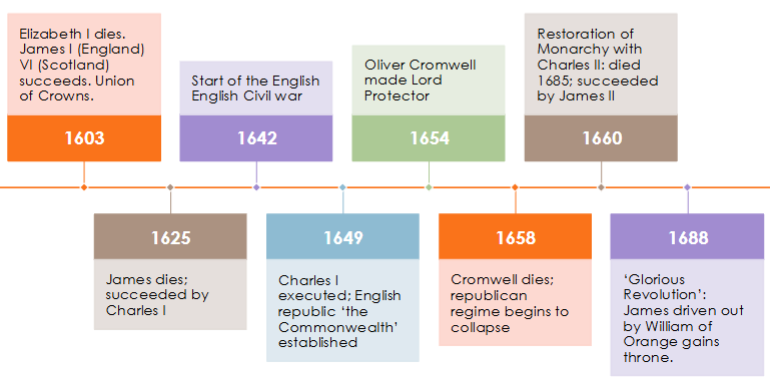Week 3 - Paradise Lost
The Christian story told in the form of an epic.
Historical Context
Century of Revolution 1603-1714, Christopher Hill
The years between 1603 and 1714 were perhaps the most decisive in English history… The transformation that took place in the seventeenth century is far more than a constitutional or political revolution, or a revolution in economics, religion or taste. It embraces the whole of life
Politics
Changes in all areas of life, with Milton as an important part.
New technologies of reading, writing and publication contributed to the circulation of new ideas. The printing press in Gutenberg, allowed for more accessible writing in many languages.
Period when basic beliefs were formed, early modern society.
Chronology

Aligned himself with those unsatisfied with royalty.
Milton believed for emphasis on the individual and their relationship with God.
Milton was a supporter of regicide, signed the kings death sentence, part of Cromwell’s government.
Complicated work dealing with issues around freedom, authority, submission, rebellion and free choice. These were issues at the political forefront of Milton’s time. Paradise being Lost, reflecting on another story of warfare and rebellion - within the Bible.
System limiting the power of king, with the government being the most important decision making force. Politically, by the end of the century, the king is dependent on parliament as opposed to the beginning of the century which was the opposite.
Religious/Philosophical
freedom of conscience
to understand political power aright, and derive it from its original, we must consider what estate all men are naturally in, and that is, a state of perfect freedom to order their actions, and dispose of their possessions and persons as they think fit.
Beginning of 17th century, Patriarchalism emphasises that God had given political power to Adam, which was passed down through men. People must obey the king. John Locke saw political authority through a social contract.
Biography
1625 - admitted to Christ’s college Cambridge
1638-9 - visits Italy received into academies in Florence; meets Galileo etc.
1642 - marries first wife Mary Powell who leaves him in 1645; Milton tries to get her back
1644 - sight begins to fail. Doctrine and Discipline of Divorce
1646 - first daughter born
1649 - Secretary for Foreign Tongues in Cromwell’s government. Tenure of King’s
1652 - loses eyesight completely; wife dies
1658 - begins Paradise Lost, dictated to his nephew. Second wife dies. Writing pamphlets on domestic, religious and political liberty
1663 - marries third wife
1665 - Paradise Lost exists in ms.
‘Thus it was that by the middle of 1652, little more than a decade after returning to England young, brilliant, ardently idealistic and hopeful, and with the best education possible at the time… Milton found himself widowed and blind with three daughters to raise, the oldest of whom was six.’
Milton set out a complex religious and political philosophy in a wide range of writings and had been active in living out political beliefs.
trained himself up as a serious poet; while he had been planning other significant forms, such as a history of Britain, and as Arthurian epic, it was Paradise Lost that was to be the culmination of his plans and literary career.
Paradise Lost was published at a time when his own political cause appeared to have been lost.
Literary Context
Tasso demonstrated two things that would prove crucially important to Milton: that an epic poem in the tradition of Homer and Virgil could be written in the modern age and that the specific conventions of the epic poem - set battles and single combats, noble speeches and debates, elaborate descriptions and similes, supernatural interventions and omens, and, not least of these, invocations of the muse - could be adapted to a Christian subject.
Literary terms
Literary decorum - certain topics, supposed to be written about in appropriate forms and styles. Conventions to be followed by the writer. Rigid ideas in previous centuries. Idea that elevated language should be used rather than vulgarities.
Epic simile - Wide setting, great actions, supernatural forces. Particularly involved and developed.
Milton wanted his poem to be different, and test qualities such as the hero, similar to some strains of Christianity.
How does the poem uphold conventions, and how does it undermine others.
Combination of public and private spheres, how the world will be in a prelapsarian state.
Milton’s language
TS Eliot: “Milton writes English like a dead language.” - too formal/archaic
FR Leavis: “He exhibits a feeling for words, rather than a capacity for feeling through words.”
Christopher Ricks: “Milton uses such fluidity of syntax so that it both makes clear sense and also is suggestive.”